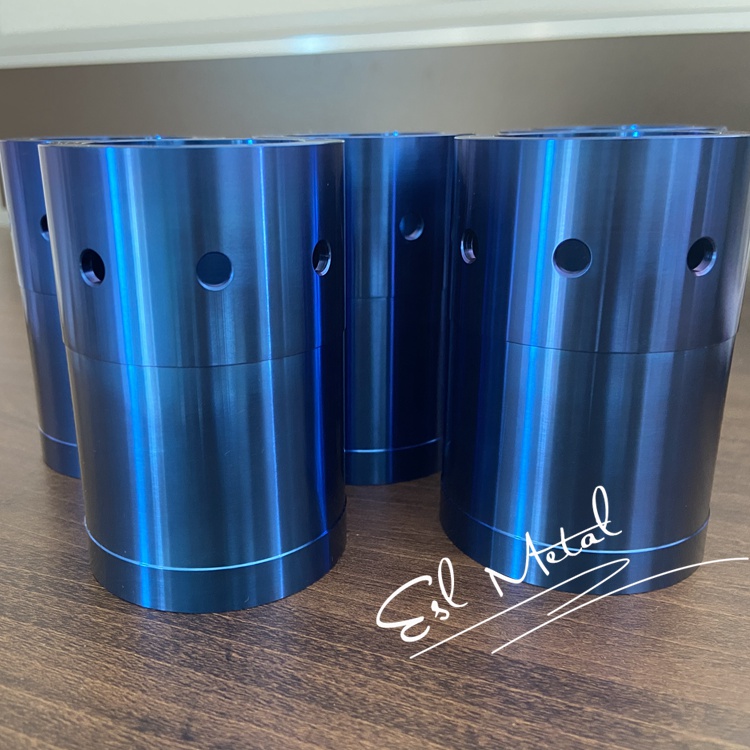
Titanium has excellent mechanical properties. The hardness of blunt titanium is moderate, between the hardness of dentin and enamel, and the ductility is good. Pure titanium is a silver-gray metal with a small specific gravity, a density of 4.5 g / cm3, a quarter of a gold alloy (19.3 g / cm3), and a half of a cobalt chromium alloy (8.5 g / cm3). Therefore, the pure titanium stent for removable partial dentures is lighter than the cobalt-chromium alloy stent and weighs only 1/2 of the latter. In 1997, American scholars made it with cobalt-chrome alloy, pure titanium and titanium alloy (Ti-6Al-4V) Retainable retaining rings for partial dentures, which are simulated in clinical use for 3 years, prove that retaining rings made of titanium and titanium alloy can be placed 0.75 mm below the observation line of the abutment, and the reduction, deformation and breaking of the retaining force of the retaining ring are significantly lower than Cobalt-chromium alloy retaining rings. Titanium and titanium alloys are considered more suitable for removable partial denture brackets. Titanium has good corrosion resistance. Titanium has a strong affinity with oxygen. When exposed to air for 1ms, the titanium surface can form an oxide film (TiO2) with a thickness of 10um. After being destroyed, it can be recovered within a few nanoseconds. TiO2 on the titanium surface has strong corrosion resistance and good anti-permeability. It has a protective effect on titanium and can resist electrochemical erosion.
Excellent biocompatibility is one of the important reasons why titanium is widely used in medical fields. The biocompatibility of titanium is due to its strong corrosion resistance, which is different from metals such as gold and platinum, which is corrosion resistant due to electrochemical inertness. Titanium is due to the surface oxide film. This layer of oxide film is tightly and firmly bonded to the parent metal, so that titanium will not be attacked by the oral saliva environment. At the same time, the cytotoxicity of pure titanium is significantly lower than that of metals such as cobalt, chromium, and nickel, and will not cause local or systemic adverse reactions. Therefore, the pure titanium prosthesis has no reaction with the oral tissue, has good wearing suitability, no allergic symptoms, no metallic taste, and no color change. Titanium implantation can also form osseointegration with bone tissue. The thermal conductivity of titanium is 16.3 to 18 w / m ° C, which is lower than that of gold alloys, cobalt chromium alloys, and nickel chromium alloys, and is 1/17 of that of gold alloys. Therefore, pure titanium restorations have the advantage of protecting dental pulp tissue from hot and cold stimulation. Titanium is semi-blocking to X-rays. X-rays can show the lesions of the dental tissue in the titanium crown, which is convenient for the diagnosis and treatment of clinical diseases, which is an advantage not found in other dental alloys. At the same time, X-ray non-destructive inspection can be performed on titanium castings, especially the presence of internal air holes, which is helpful for the quality control of titanium restorations. Titanium has poor casting properties. The melting point of pure titanium is as high as 1677 ° C, which is the highest melting point among dental casting metal materials. Titanium is chemically active at high temperatures and easily reacts violently with substances such as oxygen, nitrogen, and hydrogen to form stable compounds, which destroys the mechanical properties of titanium. Therefore, hot processing operations such as casting and welding of titanium need to be performed in a vacuum or inert gas environment, and the vacuum degree is higher than 0.133 × 10-3 kPa. Argon gas is usually used for inert gas, and its purity is higher than 99.99%.

prev:Three methods for measuring the phase transition temperature
next:Development status of computer hardware materials